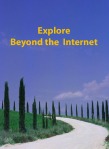 This is Week 12 in my Beyond the Internet series in which I explore the sources of information beyond our computer screens. This week’s topic is Church Histories. I’d love it if you wanted to join in with your thoughts on this topic. If possible please provide a link to your post on this page.
This is Week 12 in my Beyond the Internet series in which I explore the sources of information beyond our computer screens. This week’s topic is Church Histories. I’d love it if you wanted to join in with your thoughts on this topic. If possible please provide a link to your post on this page.
Does this sound like one big yawn to you? Lynn Palermo over at The Armchair Genealogist has written this week about the importance of background reading for our family history. Learning more about our ancestors’ parish churches is important to our understanding of their day-to-day lives at a time when the church used to be such an integral part of peoples’ lives.

You might be surprised at the treasures hiding within these books: sometimes information about specific people even though more often it will be general information. Obviously we’ll mostly each need our own reference reading list, given our ancestors’ different geographical areas.
Even biographies of senior churchmen can be helpful. One of the most informative church books for my own family was the biography of Robert Dunne, Archbishop of Brisbane. There are countless references to how Dunne interacted with his parishioners (which included my Kunkels), his visits to the railway camps and how he viewed them, his encouragement of land purchases etc. It also documents how he got into strife for not providing sufficient pastoral care for his German-speaking Catholics. The petition transcription includes the names of four of “my” Dorfprozelten families, not to mention quite a number of other German Catholics (I’d love to see the original but they have been unable to locate it).
Centenary histories of churches can be particularly useful though they may have a variable standard of documentation.

These are some of the things I’ve found in the church histories or biographies:
- References to petitions and signatories.
- Details of subscription lists for the construction or improvement of churches.
- Donations of specific items for the church interior –stained glass windows, communion vessels.
- Extracts of old church newsletters.
- Reference to Rev Benjamin Glennie’s diary entries and remote pastoral travel on behalf of his Anglican flock. I have wondered if the teamsters who helped him cross the Condamine River in 1857 included my 2x great grandfather, Denis Gavin who was working as a teamster in that area.
- The catechism class at St Stephen’s Catholic Church, Brisbane in January 1860 (wouldn’t you love to find a family member in this list? I would!)
- Sunday School prizes.
- The names of churchwardens in 1907 for Anglican parishes in Childers, Cleveland, Dalby, Drayton, Esk, Gayndah (Warra history)
- Photos/sketches of old churches, now demolished or decommissioned.
- Early baptisms in the pioneer churches as priests rode hundreds of miles to marry people or baptise children.
- Early confirmation ceremonies reported in the newspapers.
Among my collection of church histories to which I’ve referred in this post are:
Robert Dunne, Archbishop of Brisbane. Byrne, N J. The University of Queensland Press, Brisbane, 1991.
St Michael’s Church, Gorey (Wexford) 1839-1989, Forde,W (ed) 1989
The Foundation of the Catholic Church in Queensland, Martin D W, Church Archivists’ Press, Brisbane 1998
St Mary’s Story: a history of St Mary’s Catholic Parish, Ipswich 1849-1999, St Mary’s Parish Historical Society, Ipswich, 1999.
A Century of Service, All Saints’ Warra 1907-2007, All Saints’ Restoration Committee.
Because my family had a habit of founding churches and because my father was a minister, I’ve found church histories to be very valuable to learning more about my parents and grandparents. At one point I thought I might be able to use church records to prove who owned my 2x great grandmother during slavery times but I could never find the records I needed. Luckily a newspaper article proved it for me.
LikeLike
Kirstin isn’t it interesting how many ways there are to find out information about our families? You have so many diverse documents on your blog.. veritable riches, including all those letters. It’s great that you found the slavery information elsewhere -despite knowing intellectually the timeline of slavery I still find it so astonishing that your 2xgreat grandmother was a slave as it’s roughly the same timeline as my pioneers to Australia. Personalising history certainly brings it home to us.
LikeLike